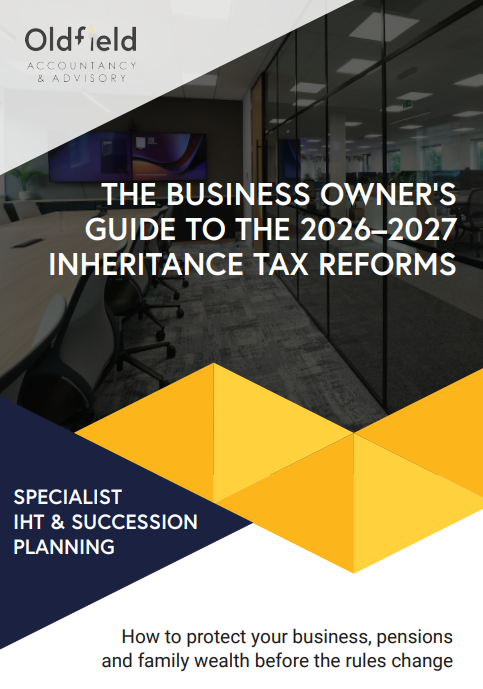Inheritance tax changes from April 2026 will impact business owners, family farms, and anyone with significant pensions or investments. Now is the time to review your estate planning and take steps to reduce future tax burdens.
Snapshot Summary
Major inheritance tax changes from April 2026 will affect business owners, family farms, trusts and anyone with significant pensions or investments. Key updates include a £1m cap on 100% Business and Agricultural Property Relief, pensions to be taxed from April 2027, and changes to trust reliefs. Acting now is essential - review succession plans, check business assets and trust planning, update wills and consider key actions to be taken before the new rules take effect .
Early action is particularly important as further potential changes to IHT reliefs, including reducing or capping lifetime gifting, are rumoured in the next Budget, which could limit planning opportunities.
From April 2026, long-standing reliefs will be reduced, and the cost of inaction could be devastating for families. Here is what is changing, who is affected, and the actions you should take now.
What is changing?
The government is updating the rules for some key IHT reliefs and pension rules.
Business and Agricultural Property Reliefs
- Currently:
- Agricultural Property Relief (APR) and Business Property Relief (BPR) can reduce IHT by up to 100%, with no limit on the value of qualifying assets.
- From April 2026:
- Business and agricultural assets will qualify for a £1m allowance of 100% relief and any value in excess of this will be subject to a reduced rate of 50% relief.
- Any value above £1m will only qualify for 50% relief, resulting in a 20% tax charge (40% IHT × 50%) on the excess.
- These limits apply per individual. Unused allowances cannot be transferred to a surviving spouse, unlike the nil-rate and residence nil-rate bands. This will require affected individuals to change their wills with effect from 6 April 2026.
Pensions
- Currently:
- Pensions are inheritance tax free and are not counted as part of a person’s estate.
- From April 2027:
- Unused pension funds and death benefits will face new tax rules from April 2027.
- Pensions will no longer be exempt from inheritance tax. This means IHT may be payable on your pension when you die.
Trusts
- Currently:
- BPR and APR assets can be transferred into and out of trusts without triggering IHT, and trustees pay no IHT on ten-year anniversaries. This will change significantly, requiring a full review of trust planning for succession.
- From April 2026:
- Changes to how trusts holding business or farm property will qualify for reliefs, means that planning around trusts will need to be reviewed prior to April 2026.
- Each trust settled prior to 29 October 2024 will have its own £1m allowance for 100% relief. Trusts settled by the same settlor on or after 30 October 204, will have the £1m allowance split across all relevant trusts
- There is currently a window open until 5 April 2026 enabling individuals to consider the use of trusts for succession planning and IHT mitigation strategies before Apr 2026.
Who is affected?
Almost all business owners with estate planning needs will feel the impact, especially those in:
- Limited companies
- Family businesses and partnerships
- Family farms worth over £1m (common under current land values)
- Family trusts holding company shares or land
- Individuals with significant pension savings and investments
Waiting until April 2026 could cost you thousands in unexpected taxes. Early planning allows you to:
- Use current, more generous reliefs before they change
- Restructure your business or assets to remain eligible
- Update pension and trust arrangements to avoid new tax traps
 We have created a handy guide to help you to understand and navigate your IHT exposure. Get your free guide below.
We have created a handy guide to help you to understand and navigate your IHT exposure. Get your free guide below.
What you should do now
We strongly recommend that you:
- Review your succession plan – Speak to your family and advisers to review your business succession plans
- Check your business assets – Confirm your assets still qualify for IHT business relief under the new rules
- Review your will – Ensure it makes full use of APR/BPR allowances. It is highly likely some changes will be required to your will
- Consider trust planning – New trust structures may require careful consideration. Assess whether transfers in or out of trusts should be completed before April 2026
- Make use of lifetime gifting – Now may be the ideal time to act, even ahead of the upcoming Budget day
- Review asset ownership between spouses – Optimise relief allocations
- Review your pension strategy – Prepare for the expected changes from April 2027
- Seek professional advice – Timing, valuations, and structures are critical to success. Expert advice can save you money and stress by ensuring your plan works under the new rules.
A final point...
The proposed IHT changes are significant, forcing individuals and families to reassess governance and future strategies. These once in a generation changes will affect many business owners, but with early planning, you can protect your hard-earned wealth.
Taking steps to reduce the impact of the Inheritance Tax changes could also have knock-on implications in a variety of tax, legal, or commercial ways, so it is vital to coordinate with professional advisers to work through your options with you.
Protect your legacy from the 2026 IHT changes. Speak to our expert team today.
Our team specialises in IHT and succession planning for business owners. We provide tailored advice and practical solutions to help you navigate the 2026 changes. Contact us today to book a free consultation or watch our recent webinar.
Please note: This article is provided for information only and was correct as at the time of writing (21/08/25). Any lists and details provided above are not exhaustive and are not intended to be full and complete guidance. No action should be taken without consulting detailed legislation or seeking independent professional advice. Therefore, no responsibility for loss occasioned by any person acting or refraining from action as a result of the material contained in this article can be accepted.
Share Article
You give us 30 minutes of your time. We'll give you growth and a plan
It's easy to book an initial consultation - just provide some brief details, and your preferred date and time, and we'll reply by email to confirm your appointment.
Contact us





